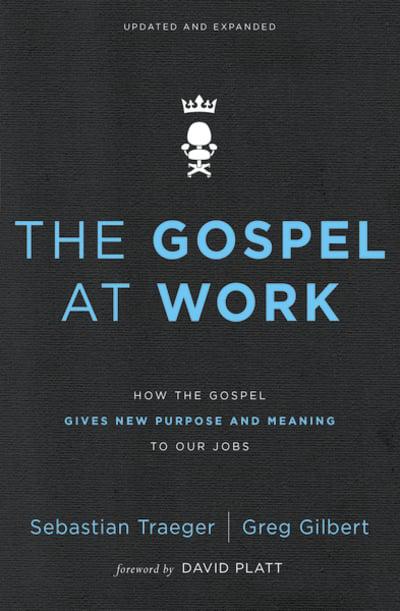Andrei Rogobete: “The Gospel at Work” by Sebastian Traeger & Greg Gilbert

“The Gospel at Work” by Sebastian Traeger & Greg Gilbert is a relatively recent addition (published 2018) to the cohort of literature that aims to focus on faith within the workplace. This is a topic that likely stirs interest from secular and religious audiences alike. What role does a person’s faith have at work? How should work be understood by Christians? How can we develop a biblical understanding of work? These are just a few of the main questions addressed in the book.
The authors bring together relevant and varied knowledge on the issue. Sebastian Traeger is a former technology entrepreneur and current Vice President of the International Mission Board for the Southern Baptist Convention. Greg Gilbert is the author of several books and currently serves as the senior pastor of Third Avenue Baptist Church in Louisville, Kentucky.
The central message or ‘thesis’ of the book is that, regardless of your job, you are ultimately working it for God, “Who you work for is more important than what you do” (page 17). This is, as the book points out, contrary to what “the world” considers successful and important.
The premise is based on the words of the apostle Paul in Ephesians 6:7 where he calls to “Serve wholeheartedly, as if you were serving the Lord, not people”. Yet the focus is not just on the action itself, but also the attitude of heart. In Colossians 3:22 Paul calls people to work with “…sincerity of heart and reverence for the Lord” (page 16).
“The Gospel at Work” is devised into eleven main chapters and here we will touch upon some of the main points that arise.
Chapters I and II start with a dichotomy that sets the tone for the rest of the book: “The Idolatry of Work” versus “Idleness in Work” (pages 13 & 23). Traeger and Gilbert capture well the two extremes that many Christians risk falling into: making work their idol on one end, or rejecting it as anathema to God’s purpose for their lives on the other end.
There is nothing wrong with ambition or determination in our careers. However, the authors rightly point out that “trouble starts when our pursuit of enjoyment or influence or status in our work begins to make our work the source of ultimate satisfaction or meaning for us” (page 25).
Equally damaging on the other end of the spectrum is ‘idleness’ at work. Idleness here does not necessarily mean to be idle per se (while others provide for you), but rather a more subtle expression “that has less to do with productivity of our hands and everything to do with the motives and desires of our hearts” (page 35).
Chapters III to V take the discussion further and develop guidance on issues such as the gospel in work, God’s purpose for us, and choosing a job or career path. An interesting point is made on the correct order of priorities when making career choices expressed in the form of a pyramid. God sits at the foundation, serving others is in the middle, and loving the ‘self’ is the tip of the pyramid coming third (page 75). The book recognises that in reality, these priorities are often reversed: the self comes first, pleasing others is second, and serving God is third (page 79). The authors propose that as a remedy Christians must keep the right perspective: work is temporary, God is eternal (page 81).
Chapters VI to VIII continue with practical applications such as balancing work with faith and family, managing work relationships, and what it means to be a ‘Christian boss’. A useful discussion can be found on the nature of competitiveness in the workplace where the authors (rightly) argue that, “It’s not competition the Bible forbids, but rather the world’s playbook for competition. […] Win by running faster not by tripping all your competitors” (page 106).
The final chapters IX to XI take a more outward look and consider topics such as sharing the gospel in a secular space, the value of full-time ministry, calling, and defining success. On the latter the book makes the point in not defining ‘success’ by what the world considers ‘success’ but rather in the ability to one day stand before Jesus and say “Lord, where you deployed me, I served well. I gave it my all. I worked at it with all my heart because I was working for you, not for human masters” (page 158).
In concluding, “The Gospel at Work” is an excellent resource for anyone interested in the topic of faith within the workplace. It combines practice and theory well, using clear examples and principles that are backed by scripture. One point of contention could be that the authors write with great certainty. On one level this is perhaps not bad thing but on another it does, at times, make the book read like a ‘self-help’ piece of literature – one that was made to hit bestselling charts. Problem A is solved by doing X, Y, Z. I am sure, however, that this was not the author’s intent.
It is perhaps more of an observation than a direct critique. Yet one cannot help but feel that God’s “…ways are above [our] ways…” (Isaiah 55:9). There is an element of God’s mystery in life that often cannot be solved by simply following a clear set of instructions (good and correct though they may be). This perhaps an aspect that could have been developed more in the book. Nonetheless, it is a recommended read for anyone with an interest in the subject.
“The Gospel at Work” by Sebastian Traeger & Greg Gilbert was published in 2018 by Zondervan, 160pp.
Andrei E. Rogobete is the Associate Director of the Centre for Enterprise, Markets & Ethics. For more information about Andrei please click here.

